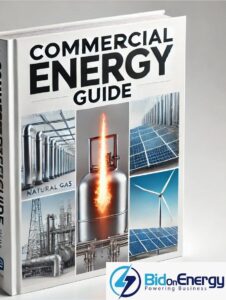Commercial Energy Guide
A business would need an energy guide to navigate the complexities of energy procurement and management. With fluctuating energy prices, diverse suppliers, and different rate structures, businesses can struggle to make informed decisions about their energy consumption. An energy guide provides clear, concise information on how to compare suppliers, evaluate contracts, and choose between fixed or variable rates, ultimately helping businesses lower their operational costs. This guide is essential for those unfamiliar with energy markets or who need a structured approach to achieving energy efficiency.

Helping Businesses Shop for Electricity and Natural Gas
Today an energy guide offers insights into energy-saving strategies, renewable energy options, and regulatory compliance. Businesses can use these guides to identify cost-saving opportunities through energy efficiency programs, government incentives, and sustainability practices. As energy consumption plays a significant role in a company’s expenses, understanding how to optimize it can give a competitive edge while contributing to environmental sustainability.
Energy costs are a major expense for businesses. With fluctuating prices, it's crucial to compare electricity and natural gas providers to save money. This guide outlines common challenges, how to compare providers, and why services like Bid On Energy can help lower utility bills.
1. Introduction to Commercial Energy
- Understanding Energy Markets: Explain how the commercial energy market operates, including supply and demand dynamics.
- Energy Deregulation: Discuss how deregulation affects businesses and the opportunities it presents for choosing suppliers.
2. Common Challenges in Energy Procurement
- Fluctuating Energy Prices: Highlight the volatility of energy costs and its impact on business budgets.
- Complex Contracts: Describe the intricacies of energy contracts and potential pitfalls.
- Limited Supplier Knowledge: Address the difficulty businesses face in identifying and evaluating multiple suppliers.
3. Benefits of Shopping for Energy Providers
- Cost Savings: Explain how comparing providers can lead to lower utility bills.
- Customized Solutions: Discuss the availability of tailored energy plans to meet specific business needs.
- Improved Contract Terms: Highlight the possibility of securing better terms and conditions.
4. How to Compare Energy Providers
- Assessing Energy Needs: Guide businesses on evaluating their energy consumption patterns.
- Requesting Quotes: Explain the process of obtaining quotes from multiple suppliers.
- Evaluating Offers: Provide criteria for comparing pricing, contract length, and supplier reputation.
5. Understanding Energy Pricing Structures
- Fixed vs. Variable Rates: Detail the differences and advantages of each pricing model.
- Additional Fees: Warn about potential hidden costs such as delivery charges or peak usage fees.
6. Navigating Energy Contracts
- Contract Length: Discuss the implications of short-term versus long-term agreements.
- Terms and Conditions: Emphasize the importance of reading and understanding all contract clauses.
- Termination Policies: Explain any fees or penalties associated with ending a contract early.
7. Energy Deregulation
- State Regulations: Outline how energy laws vary by state and affect procurement options.
- Compliance Requirements: Inform about any legal obligations businesses must adhere to when switching suppliers.
8. Energy Efficiency Strategies
- Balance load factor
- Reducing Consumption: Offer tips on how businesses can lower their energy usage.
- Sustainability Initiatives: Discuss the benefits of incorporating renewable energy sources.
9. Utilizing Energy Brokers
- Advantages of Brokers: Explain how brokers simplify the comparison process and negotiate on behalf of businesses.
- Selecting a Broker: Provide guidance on choosing a reputable energy brokerage service.
10. Case Study: Bid On Energy
- About Bid On Energy: Introduce Bid On Energy as a solution for businesses looking to save on utility bills.
- Services Offered: Detail how they assist in comparing providers for commercial electricity and natural gas.
- Contact Information:
- Phone: (302) 360-8110
- Website: https://BidOnEnergy.org
- Email: Support@BidOnEnergy.org
11. Steps to Switch Energy Providers
- Review Current Bills: Encourage analyzing current energy expenses to identify savings opportunities.
- Gather Quotes: Advise on collecting multiple offers for comparison.
- Make an Informed Decision: Stress the importance of considering all factors before selecting a new provider.
- Implement and Monitor: Suggest ongoing monitoring of energy usage and costs after switching.
12. Frequently Asked Questions
- Is Switching Providers Complicated?: Provide reassurance about the simplicity of the process.
- Will Service Be Interrupted?: Explain that switching providers does not affect the reliability of energy supply.
- How Much Can I Save?: Offer insights into potential cost savings.
13. Glossary of Key Terms
- Kilowatt-hour (kWh): Define as the unit of energy consumption.
- Demand Charge: Explain fees based on peak usage periods.
- Renewable Energy Credits (RECs): Describe certificates representing the environmental benefits of renewable energy.

